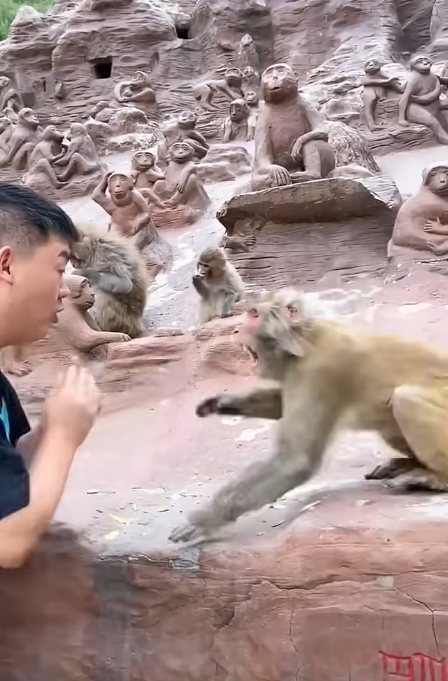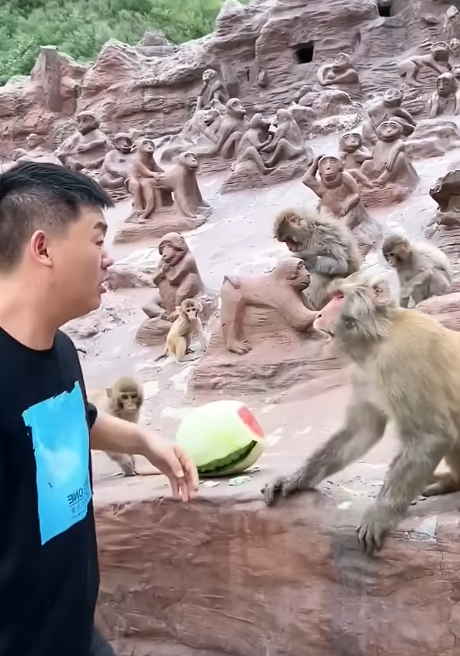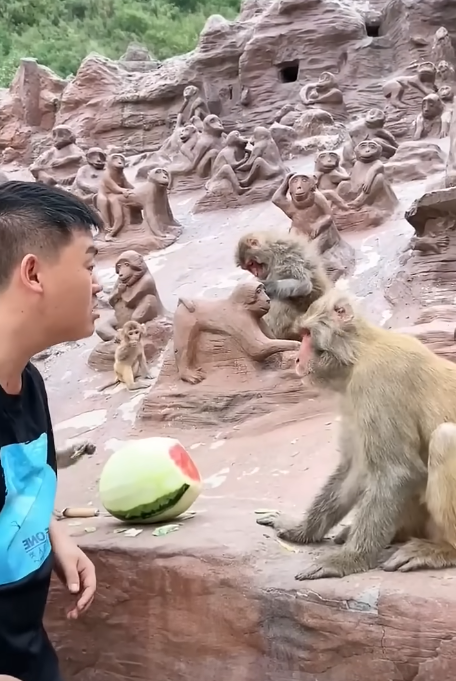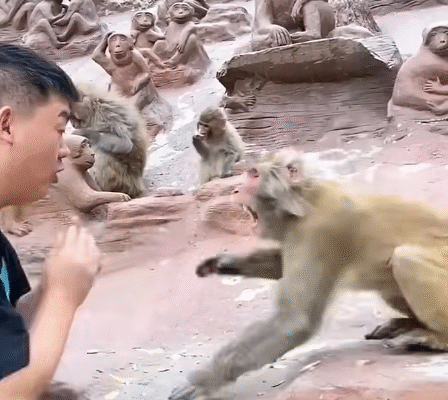
Long ago, in the misty peaks of the Heavenly Mountains, there were three monkeys unlike any other. They were no ordinary monkeys; they were kings—each ruling a distinct realm of the forest. Their names were Huzi, Mangu, and Baolan, and their beauty, strength, and intelligence were known across the lands. They were playful, clever, and mischievous, but above all, they were disciplined leaders who cared for their subjects.
However, even kings have limits, and even spirits have tempers. One fateful day, the three monkeys faced a challenge that tested the boundaries of their patience. It began with a festival, a celebration of the Moon Goddess, where all creatures of the mountains gathered to honor the celestial powers. The monkeys, as leaders of their domains, were invited to perform the grand dance that symbolized harmony between earth and sky.
Huzi, the eldest, was known for his pride. He swung through the treetops with unmatched grace, his golden fur shining under the moonlight. Mangu, the middle brother, was clever and witty, always devising new tricks that made the forest creatures laugh. Baolan, the youngest, was the strongest, capable of feats no other could imagine, yet he was gentle and kind at heart. Together, they represented the balance of mind, body, and spirit.
But harmony is fragile. During the festival, a mischievous group of forest spirits, jealous of the monkeys’ fame, decided to play a cruel trick. They threw illusions into the moonlight, making it appear as though each monkey had failed in his performance. Huzi stumbled, Mangu’s tricks backfired, and Baolan’s strength caused chaos among the festival tables. The forest creatures gasped, and whispers spread like wildfire: “The kings have lost their magic!”
Anger rose within the monkeys like a storm. Huzi’s pride burned with humiliation, Mangu’s cleverness twisted into cunning rage, and Baolan’s strength transformed into raw, uncontrollable power. The three brothers looked at each other, and in that moment, they realized they were not merely angry—they were furious beyond reason.
Their tempers ignited a force they had never known. The golden glow of Huzi became a fiery aura, scorching the leaves of nearby trees. Mangu’s cleverness turned into sharp, dangerous illusions that struck at those who approached him. Baolan’s strength shattered stones and uprooted trees, leaving the forest trembling. The monkeys, once kings, had lost themselves entirely—they became spirits of wrath.
As spirits, their powers multiplied exponentially, but so did the danger. Huzi’s fire could consume anything in its path. Mangu’s illusions were so vivid that even the wisest creatures could not distinguish reality from trickery. Baolan’s force could crush mountains. The forest trembled under their wrath, and even the forest spirits who had tricked them now cowered in fear.

The Moon Goddess, watching from above, frowned. She sent a gentle wind to calm them, whispering: “Great kings, do not lose yourself to anger. Your power is meant to protect, not destroy.” But the monkeys, consumed by their tempers, ignored her voice. They leaped from tree to tree, causing havoc wherever they landed. Birds flew screaming into the night, rivers overflowed, and the flowers wilted under their furious energy.
The elders of the forest, knowing that this rage could destroy the mountains themselves, gathered to try and reason with the monkeys. They approached cautiously, carrying gifts of fruit and incense, symbols of peace and wisdom. “Huzi, Mangu, Baolan,” they pleaded, “your anger blinds you. Return to yourselves before you destroy what you have loved and protected.”
But the monkeys’ fury was too strong. Huzi roared, sending a wave of fire toward the elders. Mangu’s illusions created terrifying visions that drove some animals into panic. Baolan stamped the ground, sending shockwaves that split rocks in half. The elders realized that reasoning alone could not reach them. They whispered to each other: “We must wait for their wrath to burn itself out. They are spirits now, untouchable by mortal pleas.”
Days turned into nights, and the forest became a place of fear. The three monkey spirits roamed endlessly, their powers unchecked. They could have destroyed everything, yet a part of their former selves—a tiny spark of kingly wisdom—remained buried deep inside. It was a spark that could only be reached through humility and understanding.
In a nearby village, young creatures who admired the monkeys from afar watched the chaos with awe and terror. “Do not try to imitate them,” the elders warned. “Their power is beyond any living being. Anger is dangerous. Learn from them, but never repeat their actions.” The lesson was clear: sometimes, even the strongest, wisest, and most skilled can be consumed by their own emotions.
Weeks passed, and slowly, the fury of the three spirits began to wane—not through punishment or scolding, but through exhaustion. Huzi’s fire dimmed, Mangu’s illusions began to falter, and Baolan’s mighty force weakened. They realized, too late, the damage they had caused, and sorrow replaced anger in their hearts. They gazed upon the ruined festival grounds, the flattened trees, and the frightened creatures. The weight of regret pressed heavily upon them.

The Moon Goddess descended in a silver light, enveloping the monkeys in her gentle glow. She said, “You have learned a costly lesson, mighty kings. Power without patience is destruction. Anger without control is chaos. Return to your forms, and remember the lesson you now carry.”
With her blessing, the three monkeys slowly returned to their natural forms. Their golden fur no longer burned, their illusions faded, and their strength became manageable once more. But the forest remembered. The animals whispered the tale for generations, and even now, parents warn their young: “Do not lose your temper, or you may become like the Three Monkey Kings, spirits of wrath who could not control their power.”
Huzi, Mangu, and Baolan, forever changed by the experience, vowed never again to let anger rule them. They became wiser leaders, teaching patience, humility, and respect to all their subjects. But deep in the forest, the memory of their furious spirits lingered like a shadow, a reminder that even the greatest kings must master themselves before mastering the world.
And so, the legend endured: the Three Monkey Kings, who once lost their temper and became spirits, serve as a cautionary tale. Their story reminds all creatures—human, animal, and spirit alike—that power is not to be flaunted recklessly, and anger is a force that can consume even the noblest heart.
Do not imitate their actions.
The forest, though eventually healed, whispers their warning every night: “Patience, wisdom, and self-control are the true marks of greatness. Rage destroys, even kings are not immune, and spirits of wrath should never be provoked.”
In the end, the monkeys learned, the forest remembered, and the world kept the memory alive—a tale of caution, respect, and the fragile balance between power and temper.



